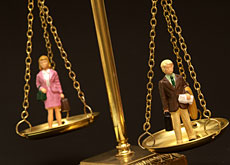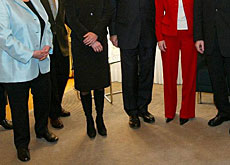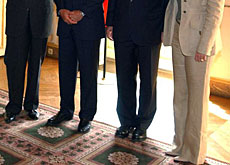Swiss struggle to achieve gender parity

Switzerland ranks far behind Scandinavian countries and even developing nations like Sri Lanka and Lesotho when it comes to sexual equality, according to a study.
Switzerland fell back 12 places compared with last year, coming 40th out of 128 countries, mainly because of the way in which Swiss salaries were calculated.
The report, published on Thursday by the Geneva-based World Economic Forum, provides an insight into gender gaps between women and men in over 90 per cent of the world’s population.
“The index is looking at gaps, not levels. We’re trying to see, regardless of overall levels of resources in a country such as health and education, how equitably they are being divided between women and men,” Saadia Zahidi, one of the study’s co-authors, told swissinfo.
“It’s true that the gap in Switzerland, relatively speaking, is much bigger than that compared with Sweden, Lesotho or Cuba.”
Four areas of inequality between men and women have been used in the report: economic participation and opportunity (salaries and high level jobs), educational attainment (basic to higher level), political empowerment (representation in decision-making structures) as well as health and survival.
Like many member countries of the Organisation for Economic Cooperation and Development, in terms of health and education Switzerland is doing “perfectly fine”, said Zahidi.
“But the areas it has to concentrate on are economic participation and opportunity, closing the wage gap and increasing labour force participation rates of women, and political empowerment,” said the author.
She explained that the fall in the rankings from 26th to 40th had almost exclusively been caused by a correction made to the United Nations Development Programme data from last year.
The UN agency wrongly estimated that annually Swiss women earned $29,000 (SFr32,700) and men $32,000 for similar work. This has now been corrected to $25,000 and $41,000, respectively.
Top of the class
Nordic nations received the best overall grades for gender parity, according to the review. Sweden, which has more women than men holding high political office, topped the list, followed by fellow Nordic nations Norway, Finland and Iceland. New Zealand, the Philippines, Germany, Denmark, Ireland and Spain round off the top ten.
Women in Muslim countries struggled to compete for jobs, win equal pay and hold political office, falling behind the rest of the world in eliminating discrimination, the report added.
Zahidi said religious and cultural reasons are important in understanding why men have economic, political, education and health advantages over women in much of the world.
Ex-Soviet republics with a Muslim majority, such as Azerbaijan and Kyrgyzstan, were in the middle of the field, but virtually all countries in the Middle East placed in the bottom third, with Pakistan, Chad and Yemen the worst.
Muslim women living on the Arabian peninsula are receiving nearly as much education and health benefits as men there, Zahidi said, “but they’re held back on political participation and economic empowerment”.
Britain fell to 11th from ninth, although it posted an increase in its overall score.
The United States, the world’s leading economy which had ranked 23rd in 2006, fell back as a result of weaker economic and employment opportunities for women, although female political empowerment improved somewhat over the year, the report said.
In general, compared with 2006 countries had made small progress on economic, political and education gaps but lost ground on health, the Forum said.
swissinfo with agencies
The WEF Gender Gap Index 2007, carried out in collaboration with Harvard University and the University of California, included 128 countries or 5 billion people – 90% of the world’s population.
The top ten were: Sweden, Norway, Finland, Iceland, New Zealand, the Philippines, Germany, Denmark, Ireland and Spain.
The United States was ranked 31st, Canada 18th and Britain 11th.
Switzerland was 40th – just behind Jamaica but in front of neighbours France and Italy.
Some developing countries scored highly: Sri Lanka (15), Cuba (22) and Belarus (23).
At the bottom of the list were Pakistan, Chad and Yemen.
Between 2001 and 2005, the rate of female participation in the Swiss workforce rose from 73.2% to 74.7%.
In 2006 45.9% of all employed people were women.
57.9% of women in Switzerland work part-time (EU 32.4%).
85.8% of women in Switzerland work in the service sector.
The number of part-time working women is increasing in all European workforces. The rate between 2001 and 2006 went up by 8.2% in Switzerland and 17.8% in the EU.
In the same time period the number of full-time working women only increased by 1.4% in Switzerland (2.6% in the EU).
Ten years after the law on equality came into force, women still earn on average 20% less than men in Switzerland.
The gap is larger in the private sector than in the public one. In public administration the disparity in pay is 10%, in small companies 15.7%, in medium-sized ones 20.4% and in large ones 30.8%.
Many women say they still hit the glass ceiling in Switzerland and there is a shortage of female top managers.

In compliance with the JTI standards
More: SWI swissinfo.ch certified by the Journalism Trust Initiative












You can find an overview of ongoing debates with our journalists here . Please join us!
If you want to start a conversation about a topic raised in this article or want to report factual errors, email us at english@swissinfo.ch.